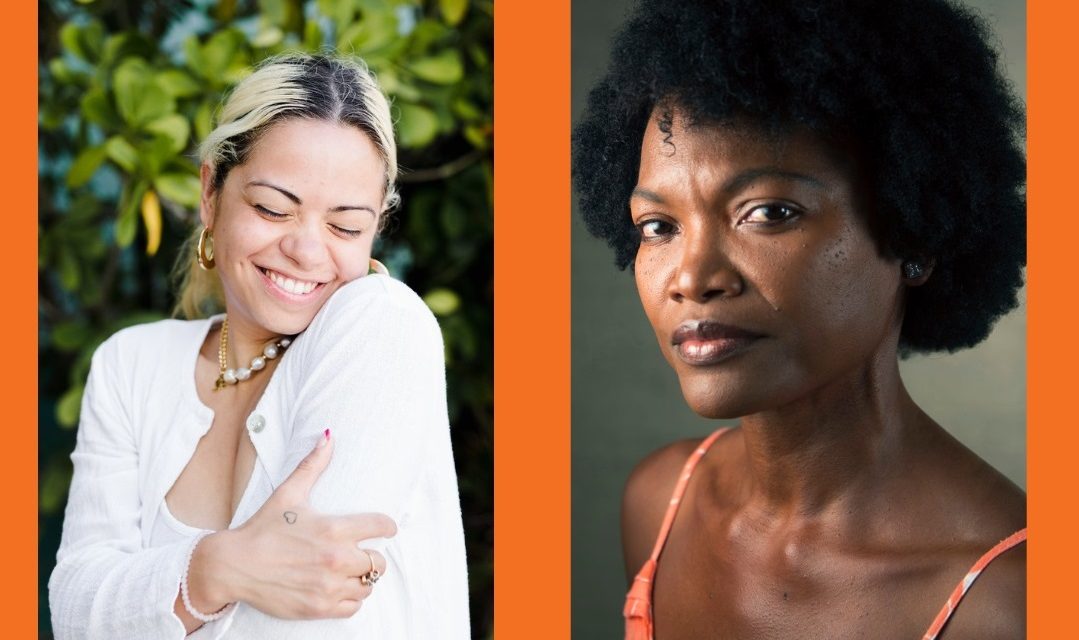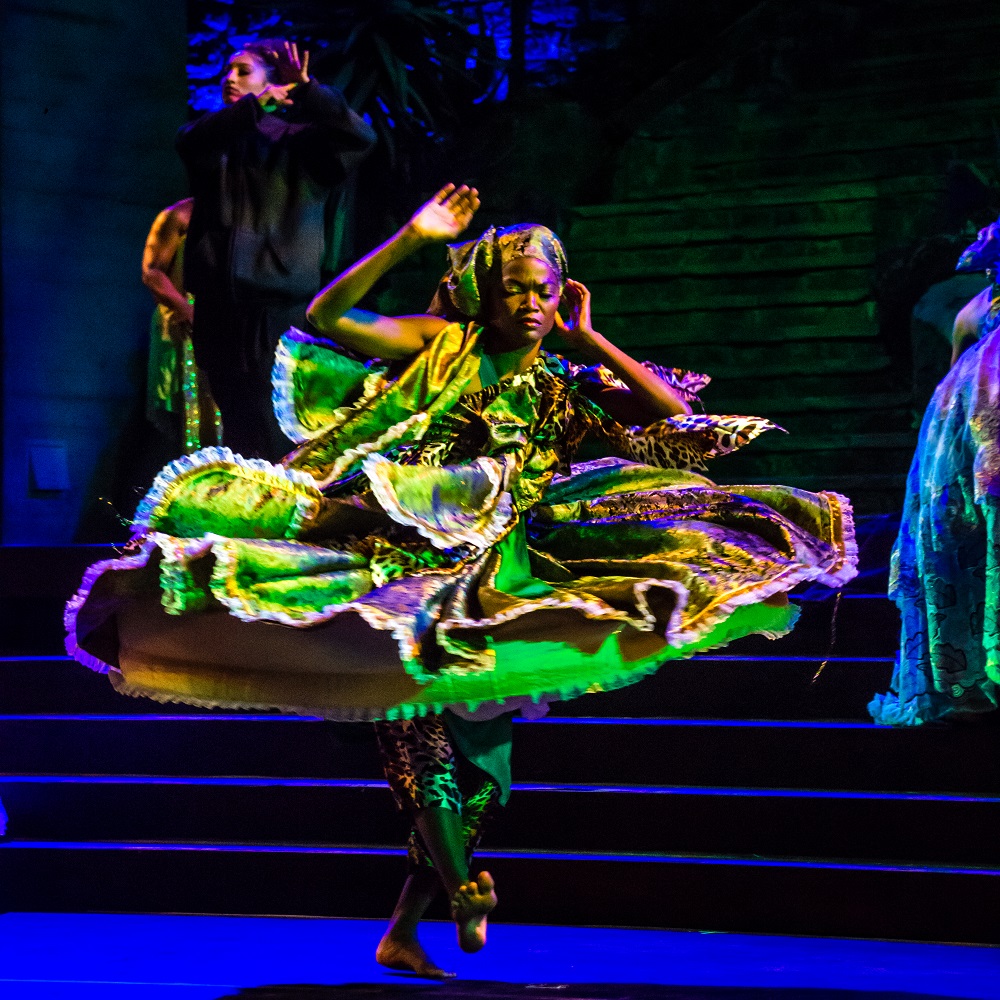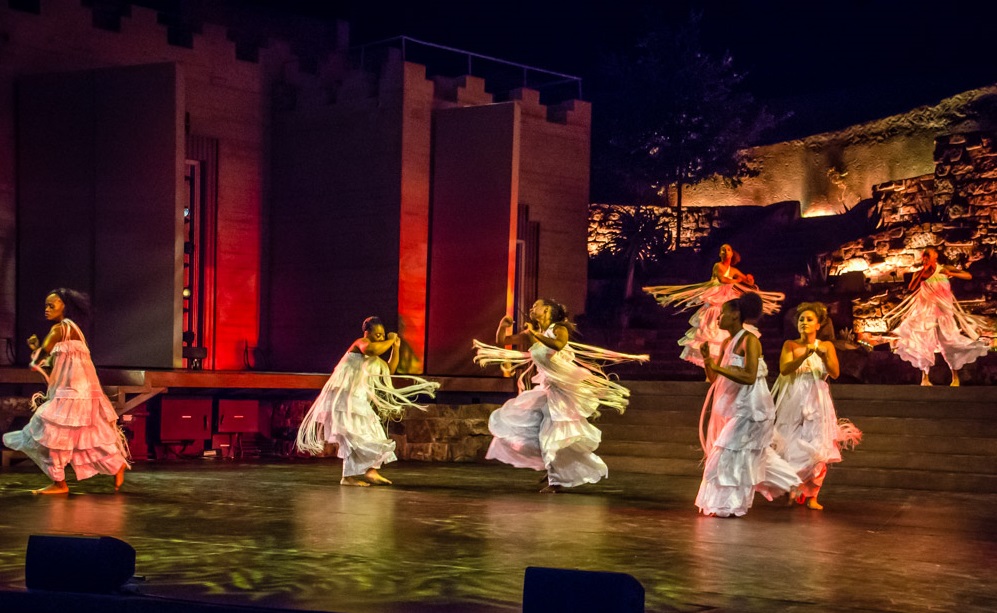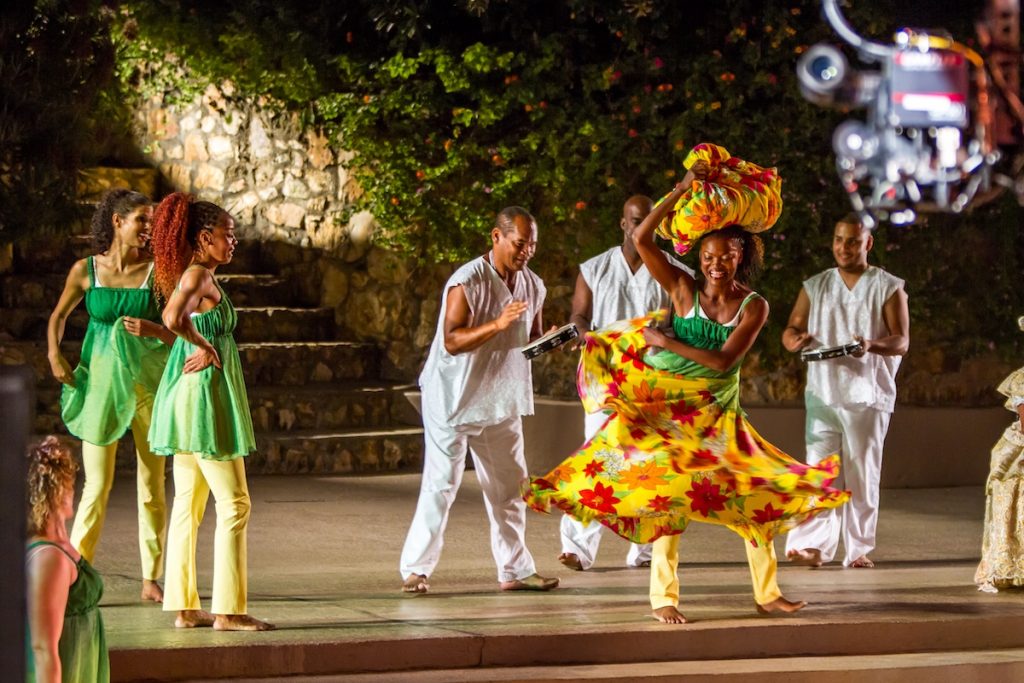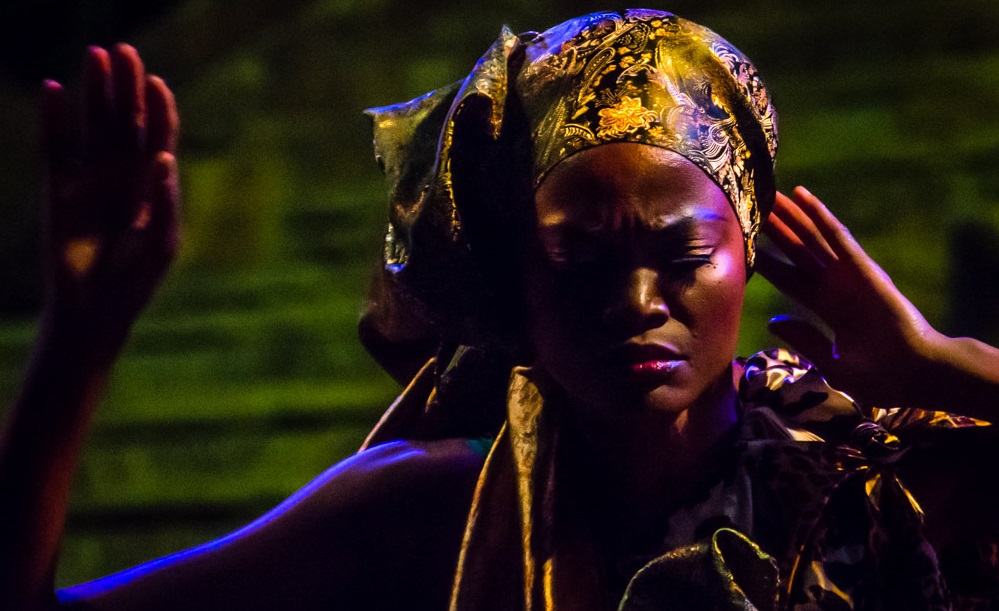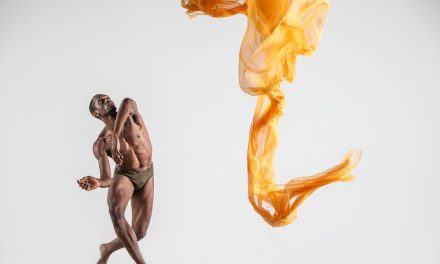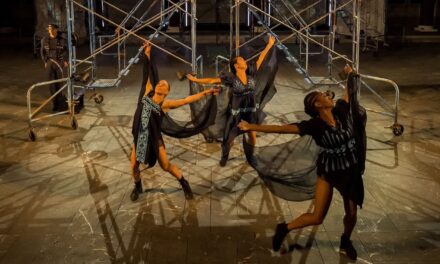One of the more vibrant dance companies in Los Angeles is Viver Brasil founded in 1997 by Co-Artistic Directors Linda Yudin and Luiz Badaró. As the new year approached, the company’s Board of Directors announced that Natalie Marrero, who has acted as interim Executive Director since October 2021 was elected Executive Director and that dancer, choreographer and master teacher Vera Passos, who has served as Associate Artistic Director, was appointed Co-Artistic Director of Viver Brasil.
Under the leadership of Yudin and Badaró, Viver Brasil has grown to include at least 50 dancers and musicians who are able to take on various performances and residencies around in California, the U.S., Mexico and right now in its sister city Salvador, Bahia, Brazil.
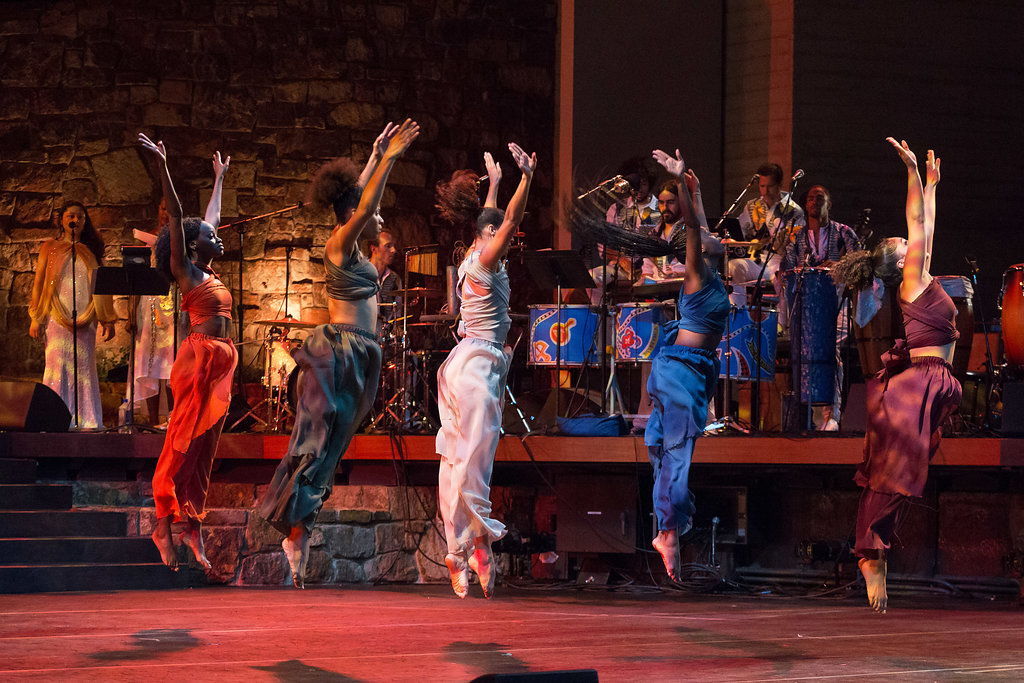
Viver Brasil in Cor da Pele with Dancers L to R Nagode Simpson, Ajah Muhammad, Rachel Hernandez, Ashley Blanchard, Bianca Medina – Photo by Gia Trovela
In order to learn more about this change in Viver Brasil’s leadership team, I invited Marrero and Passos for an interview on Zoom. Because Passos does not speak very much English, this was made possible with the wonderful talents of interpreter Paula Santos who also acts as a guide in Salvador, Bahia for the company’s annual travel program, Dancing At The Source.
Marrero related that she was introduced to Viver Brasil via Dance Resource Center in 2015 when she moved from the East Coast to Los Angeles to enter the Arts Management Graduate program at Claremont Graduate University. When she had the opportunity to experience what was happening in the art scene Marrero discovered, as many do, that the lack of culture in Los Angeles was a rumor.
“I wanted to get connected with the field and was surprised when I came to Los Angeles of how rich the art community was, and really the cultural community, as someone from the East Coast New York I thought was the Mecca.” Marrero said.
Previously, Marrero worked at the NYC Mayor’s Office of Special Projects and Community Events, The Future Project, Children Aids Society of New York, California Institute of the Arts, and consulted with organizations throughout LA County. She received her B.A. in Dance and Urban Studies from Eugene Lang College, The New School for Liberal Arts, an M.S. in Urban Policy and Management from Milano, The New School of International Affairs, Management, and Urban Policy and an M.A. in Arts Management from Claremont Graduate University. At one point, Marrero went through, as she described it, several life cycles trying to decide what her next professional life would be. It was at this period when the people at Viver Brasil asked her to return to Los Angeles.
“My return was frankly as an interim Executive Director,” she explained. Linda Yudin was planning on taking an extended sabbatical from the company to spend more time in Brazil. The former Executive Director had left the Board was beginning a national search. The Board asked Marrero to take on the position but she said that she would only stay long enough to help the company through this transition.
The two potential candidates bowed out for personal reasons and, referring to Marrero, the Board recruiter stated that the person who was perfect for the job was in the room at the time. With the Board’s encouragement, Marrero agreed to accept the position of Executive Director.
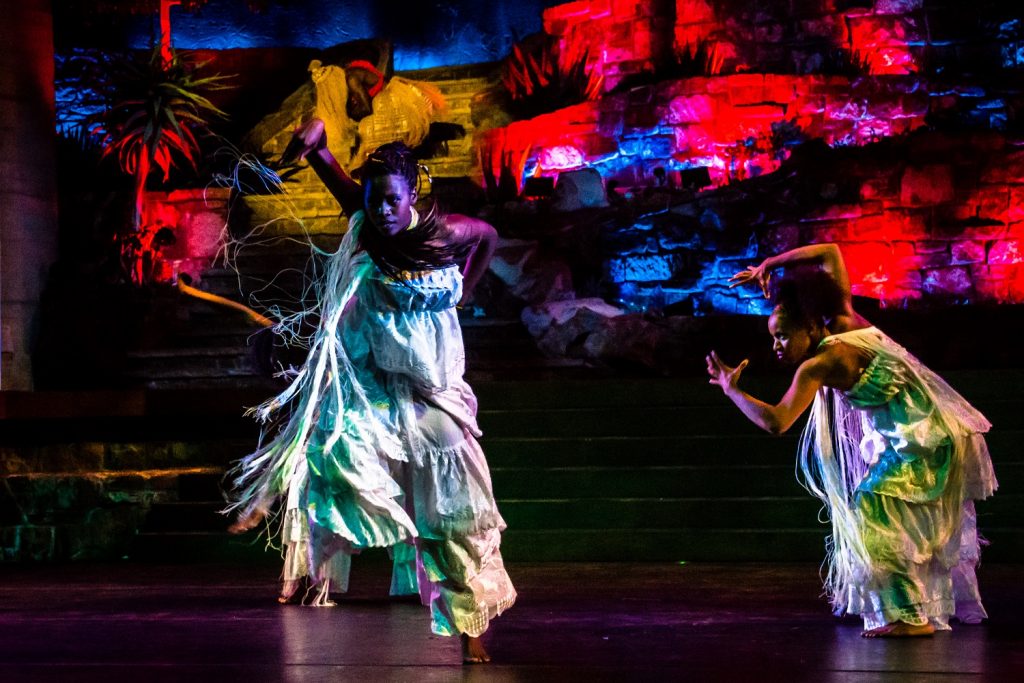
FIX Viver Brasil in Ramunha with Orixa Obaluaiê with Dancers Ashley Blanchard, Ajah Muhammad in background Samad Guerra – Photo by Jorge Vismara
“I genuinely love Viver Brasil! I’ve always loved the company and feel like now in my career, I’m able to grow as a professional and a leader in a different way” Marrero said, relating how following the pandemic, this time with the company feels like everyone has evolved. “There’s many different reasons, but it feels karmic in a sense, to be back, and that we’re all in a different place” she said. “I also think that there’s a different level of clarity from the artistic team, [From] all 3 artistic directors about the legacy of the institution.”
Marrero questioned herself about what the next iteration would or should look like. “It’s honoring ancestry and also using that as a guide for inspiration. I think more outwardly. And Vera has also acquired a space in Brazil. That for me gives us a grander vision of what does being connected to our source look like?” She responded to her own question. “Because even though we are in LA, based in the US Nonprofit, we are very connected to our roots in Salvador, and it would be remiss if we didn’t look at that. We talk about the living bridge like we have the living bridge but where does it get to? Now I think there’s really a tangible space. I think for myself, as a young woman, as a young leader of color, [that] I’ve positioned myself without realizing it is a way that I can help and really create a beautiful infrastructure that inspires that next generation that’s beyond me.”
She knows that all of the above is beyond just herself and Passos. The founding co-directors are still very much involved with the company, as are the dancers and musicians here and in Brazil.
“She’s (Yudin) still very much involved, but I think she also understands that in order for it to live beyond her, she has to take a step back, and I also think, just like anybody, she is reconciling what’s next in her creative world, what’s next for her in that space.” Marrero added that having spent time with Passos, Yudin, Badaró, and Paula in Salvador, that what she has suspected for a very long time is true – that there is nothing like Viver Brasil anywhere else in the world.
“We’re all at a place to dream really big and that’s why I ultimately said yes to the job again” Marrero said. “It feels like home to be here and again, it’s really beautiful to see how Vera has grown over the years as well, and to see where she wants to go. And also how we all guide each other on figuring out what our north star is.”
Viver Brasil has its roots in Afro-Brazilian dance theater and music along with a rich mixture of ancestral practices and street styles that addresses present and future issues that cross racial and social lines. Passos is a dance artist who has been active in all these areas for many years in Brazil before coming to Los Angeles. She is considered a pioneering choreographer, master teacher and extraordinary performer. Regarding her work. Passos has stated “my culture is my inspiration. When I dance, my feet speak with the earth… bringing ancestral messages of joy, resistance, and transformation.” Before she joined Viver Brasil, Passos danced with the acclaimed Balé Foclorico da Bahia for 10 years as a principal dancer and has danced with the acclaimed Jorge Silva Dance Company.
Everything changed for Passos when in 2010 Yudin walked into her classroom. The two women connected instantly and as Passos described it, “We fell in love.”
“When I came into the room in 2010 I was in a process of teaching many classes in Salvador, and one of the things that made me sad is that the students who came stayed with me for a period a time, and then they left, and many of them sometimes I wouldn’t see them for one or two years” Passos said. “There was always this rotation of people around me, and oh, I got attached many times, but I knew that they were leaving, that they were not staying, that maybe I was not even going to see them for a long time.”
Passos learned that Yudin had not only fallen in love with the Brazilian culture, but that she had found the love of her life there. So, when Yudin asked her to come to Los Angeles Passos said yes. When she walked into Yudin’s home in Los Angeles she reflected, “I am in Bahia” because of the many symbols on the walls and around the rooms that represented her own culture. She knew that it was not only Badaró’s love of Brazil, but Yudin’s because she was the person who decorated the home.
“He (Badaró) was already my brother, being from my land, he was like a brother, that I was encountering in this place outside of Brazil, and we know that the dance and the arts require a lot of dedication from the people. [It] is not an easy, calm way, when we just decide to live from art. So I saw two warriors in them. Their love for our culture, who tried in every way to find subsidies, to make the company grander, and this was difficult for several reasons, so I didn’t think twice about any starts or dedication to the company.” Passos related.
“So I came first as a dancer, and right in the first year I choreographed a part of one piece. I taught a class to the community as well, and it was a constant growth of this relationship” Passos added, “not only as workers and bosses, but as a family relationship.”
“I had space to choreograph, to expose my ideas. It’s very important to me. My students ask me how they can nourish themselves of this culture, and share it without being a disrespectful, without disrespecting the ancestors of this place, and it is always very difficult to understand how to do that in a respectful way?”
Passos acknowledges the importance of artists traveling back and forth between Los Angeles and Salvador and how it feeds their souls and inspires their work. When the dancers, musicians, and teachers visit and work in Salvador they also get to experience the incredible talents of Brazilian artists like Dona Cici. This bridge between Los Angeles and Salvador is what nourishes the roots of Brazilian dance, helps it flourish and to continue developing.
“We are always thinking how to fix even more of our roots. At the same times opening a space. So this company has the visibility, and they understand that we are walking together with other companies” Passos said. “That maybe, is not talking about this cultural space, but about dance, because we want it to be recognized at first as a dance company” Passos continued.
The company is well aware of the financial competition in Los Angeles and its leaders are always willing to dialogue with other company directors. As Passos stated, Viver Brasil wishes first to be recognized as a dance company and they have dreams of not only performing seasonally in local dance festivals but of touring and performing in larger venues around the world. She does not simply want the dancers and musicians to be happy, but that the company has sustainability; that it can interact with both the dance community and the community at large. She wants the company to work with the youth and show them that dance can be life transforming.
Passos spoke so beautifully about Viver Brasil and gave me a glimpse into the heart of the company. She expressed that she considers Viver Brasil to be the best in best in the world in what it does, how it has a dialogue with its ancestry and that the body does not go alone. She expressed how this company gives importance to the body of the dancer. That the dancer can see and understand that their body thinks and that it can dialogue with the choreographer and produce dance together.
“I want us to be this place that shows that art is for everyone,” Passos said.
Marrero spoke of Viver Brasil as a family and like all families they cry together, laugh together and yes, even fight a little. What is important is that they truly believe in each other and in their ancestry.
“When I was sitting in Brazil I could close my eyes, and the smells and the scents, and all those things were like a vortex to Puerto Rico or my grandmother’s kitchen. The only difference is people are speaking Portuguese” she said laughing. “We really do support each other in a deep way.”
Both women said that this is why they keep coming back, that it is a very different kind of relationship that is not just transactional. They strongly believe that the company’s success is due to the alignment that they have together. That it is unmatched. Presently Passos spends about 2 months in Salvador, 4 months in Los Angeles and then repeats.
The conversation turned to a new work that Passos is creating for Viver Brasil titled Rezas & Folhas (Prayers and Leaves). The company’s press release describes the work as “a genre-defying original performance ritual led by Co-Artistic Director Vera Passos. This project highlights the importance of sacred herbalism and Afro-Brazilian traditions as urgently necessary interventions in the fight for climate justice.”
I had read that Passos is very interested in healing the Earth with her work so I asked her to talk a little about Rezas & Folhas (Prayers and Leaves).
“One day I was talking to Linda, and we said that it is good for the dance to live each moment” she began. “Our mission is also this one. What is to bring questioning to what life is requiring from us, and we know that the planet Earth is crying at this moment with many things that are happening for some time already.”
Passos thinks that Covid is the overflowing of one of Earth’s wells and that there are many such wells around the world that are about to spill over. She believes that art can help heal Mother Earth and her children. She described how in Brazil they are not used to having natural disasters like hurricanes and earthquakes and so when Covid hit, the people were totally unprepared for the isolation that was forced upon them. It was eye opening for many to see that they could still embrace people without touching.
“For me, Prayers and Leaves attempts to bring the wisdom of this elderly, with men and women who are around us who are many times just thrown away because they are older. It is one thing that the elderly give away their positions because they are older” she began. ”So what I want to bring in this work is the guidance, the healing guided by these elderly men and women.”
Passos spoke about a tea that is used in Brazil and how they believe strongly in the herbs, prayer and the chanting that heals. They believe that the dance is stories told by their ancestors can also be a method of healing. She said that it is how we believed in ourselves that could be healing.
“What has saved you during this pandemic’s worse moment? What hand did you hold? What did you think and what did you want to see in that moment? Which way did you go? ” These are the questions that Passos wants to bring to her new work. “I want to bring what has healed you and how you are able to heal others, which was your contributions to heal the heart and the soul of someone. How did you contribute in this? During that moment, during the pandemic?”
“This is what I’m thinking, and these herbs, this nature that’s surrounds us and manifests in different ways, how this manifestation also brought healing, or is going to bring healing? What kind of cure is this that sometimes is just in one word, sometimes it is in an action or a food that we prepare. What a healing is this that is inside you” Passos asks.
Passos spoke about her house in Salvador and how she wants it to attract young people, especially those who live in vulnerable conditions.
“Particularly young people who have the potential for the arts. The idea of the house is to embrace these artists and the house is also very connected with the company as well. It’s the space that the company is going to have here in Brazil” she said. Passos stressed that she is always connected to Los Angeles when she is in Salvador and to Salvador when in LA.
She, along with other members of Viver Brasil, has connections in Seattle, Washington D.C., New York, Charlotte, and cities in Alabama, Mississippi and in Mexico. It is this strong connection with Viver Brazil that has helped Passos afford the House of Culture in Salvador. The company helped her organize classes and held the first fundraising event. Marrero said since the house has been acquired, she has begun thinking about global fundraising for the first time.
The company is in the process of reinventing itself following the pandemic and a trip to Mexico hails the beginning of getting back on the road. At the time, Marrero was preparing for the APAP convention that is held annually, as well as planning the company’s 2023/24 season. There is a lot of conversation within the company about how they keep and enhance their connection to Brazil.
Like many dance companies, Viver Brasil has national, state, city and county grants funding to aid in continuing to work in Los Angeles and in Alabama. They do a lot of outreach programs with the communities including District 9 in Los Angeles where they offer free performances within schools. With the help of funding, the company has been able to continue offering free classes at LA’s Nate Holden Performing Arts Center.
In August of each year the Viver Brasil travels to Salvador to host dance and music residencies as well as cultural immersions. Following their time there, the company returns for what also helps increase their visibility, 30 artists performing regularly at Disney World. They are entering their tenth season performing there and Marrero shared examples of how people have come up to her and said that Viver Brasil is not only their favorite event at Disney, but that it is the reason they keep returning.
Passos said that at first she questioned performing at Disney but has since embraced the idea. “Reflecting on the work that we are developing, I think that we did not lower our standards because we continue doing what we did” she said. “We were able to walk into this place, that was totally new for us, but we are there with our essence. We are bringing the best that comes from this bridge that connects with the population, with the Black population. So, this year I was more like observing, not dancing. It was very beautiful to see how people who are watching, how they connect with our performance.
“Rezas & Folhas”is based on Passos’s unique creative approach–refined over thirty years of professional experience–which masterfully blends traditional Afro-Brazilian dances and rhythms with experimental choreography and poignant storytelling. As a Black Bahian woman and internationally recognized master teacher of dances of the Orixás (nature derived deities worshiped in the Afro-Brazilian religion of Candomblé), Passos carries the sacred rhythms and stories of this tradition in her blood and muscle memory. Through her choreographic and pedagogic practice, Passos reifies a central learning passed down by her elders–our bodies are divine mirroring for the natural world around us.” added Marrero
Viver Brazil will be looking for new dancers and musicians and Marrero is thinking a lot about finding the money to allow Passos the time and space to work with the company on her new project, Rezas & Folhas (Prayers and Leaves). “Because of the pandemic, who is in our company has changed” Marrero said. “How people are involved has changed. Everyone has changed with how they engage with work.”
Marrero is hoping to continue having dancers paid to teach whenever the company’s leadership is away. She voiced that in a way, the pandemic has opened up a path for the new directors to think big and to grow its nucleus of artists who work in Los Angeles, Salvador and elsewhere.
To learn more about Viver Brasil to be added to their email list, please visit their website. You can also follow Viver Brasil on Instagram and on FaceBook.
Written by Jeff Slayton for LA Dance Chronicle.
Featured image: Natalie Marrero and Vera Passos – Photo courtesy of Viver Brasil

